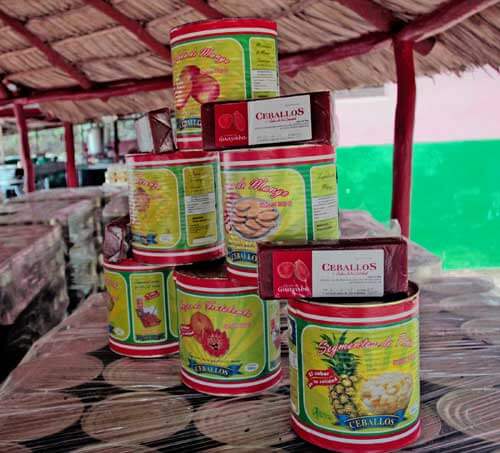CEBALLOS, Cuba , June 24, 2013 (IPS) – Homemade machines for pulverising fruit and sealing cans of preserves, created by inventive entrepreneurs, are one of the pillars of a slight rise in mini-industries in different parts of Cuba, where food production is picking up.
“We started out making guava jelly bars using kettles and homemade beaters. It produced results, and we built all of this,” independent producer Yoanky Pino told IPS, as he demonstrated each of the machines in his small workshop, where he makes up to 1,000 cans of fruit preserves daily.
Pino, owner of the La Julia farm, worked as a welder until six years ago, when he decided to start this family business in the town of Ceballos, 434 kilometres east of Havana in the central province of Ciego de Ávila.
His welding skills and technical assistance from the state-run Ceballos Agribusiness Enterprise helped him to create the machines he needed.
Little by little, he built crushing and pulping machines and a conveyer belt to carry the cans through steam until they reach the required temperature to be sealed. He also bought and fixed a cauldron that was in disuse from a state factory.
Marmalades, candied fruit in syrup, coconut jam and the popular guava bars are made every day at La Julia. The guava bars are the “star” product of the 28 private mini-factories and the two state factories in that town, José Luis Tapia, coordinator of that line of production for the state enterprise Empresa Agroindustrial Ceballos, told IPS.
The 120,000 guava bars produced daily by this group of small artisan factories are sold throughout the country as a way of diversifying the products available in Cuban pesos, Tapia said.
Many food products are only available in CUCS, the convertible Cuban currency, which not everyone has access to.
These types of initiatives were illegal until 2010, when the Raúl Castro government expanded the number of authorised private business activities in Cuba. Since then, Ceballos, a major fruit producing town, has become an enclave of mini-industries, supplied by the fruit that the local big factory does not have the capacity to process.
The recapitalisation and growth of the food-processing industry, part of the current economic reforms, is still waiting for a leap in production and productive chains in the agricultural sector, something that authorities have been pursuing since 2008, with measures such as the distribution of idle state land and access to micro-loans.
In some parts of Ciego de Ávila, different agricultural lines are growing, creating a challenge for the obsolete food-processing industry, and to a certain extent opening up the way for small artisan factories.
In October 2012, the weekly newspaper Invasor interviewed producers who were left with tons of fruit that went unharvested and undistributed due to problems with their contracts with state companies, obstacles to marketing, and the reduced capacity of the processing industry.
At that time, the importance of small agro-industries as an alternative for dealing with local agricultural growth was reaffirmed. Now there is a plan to increase fruit harvests by 2018 in Ciego de Ávila, where only 3,600 tons of fruit were obtained in 2012, compared to 30,000 in 1991.
This province currently has 37 small factories, most of them private, making it the province with the largest number of initiatives of this type.
“Mini-industries will always be needed. They cover lines of production that require a lot of manual work and are not profitable for the state processing enterprise, such as coconut jam,” Tapia said. For example, the mini-factories absorb 60 of the 91 tons of guava that his enterprise obtains weekly, he said.
The Empresa Agroindustrial Ceballos sells sugar, fruit and packaging at wholesale prices to the small private plants. They, in turn, must sell all of their production to that enterprise. “Some farmers grow fruit, and that cuts costs for them, but they are not totally self-sufficient,” Tapia said.
Stainless steel surfaces for production, better construction conditions, and small-format packaging are some of the difficulties faced by these factories, which use firewood for energy, Tapia said. “That way there would be more hygiene in production, although they all meet the essential standards,” he added.
At La Julia, one priority now is to seal off production areas with plastic netting, to keep flies out. In addition, Pino is busy completing a biogas plant, which will be used to provide fuel for the cauldron and the family kitchen. That requires him to increase his herd of pigs from 330 to 900.
“We want to be sustainable, and we want to go into the processing of cold meats and meat,” he said.
The 28 private factories in Ceballos employ some 260 workers, a figure that rises during harvest-time, such as the grapefruit harvest, which requires additional manual labour. Most of the workers are women who peel fruit.
Pino, 38, has 23 hired workers, whose pay is based on how many kilos of fruit they peel daily. “Women are more productive at that task,” he said.
“It’s hard work, but it’s good pay,” peeler Emilia Vera, who has been working at La Julia for a year, told IPS. She processes a little over 100 kg daily, for which she receives about 120 pesos (a little less than five dollars), she explained. The average monthly salary at Cuban state companies is 445 pesos (19 dollars).
Non-citrus fruit production in Cuba increased by 147,900 tons in 2012 compared to 2011, according to the national statistics office. In contrast, citrus fruits dropped by 60,800 tons, primarily because of the damage caused by the Huang Long Bing bacteria, a pest for which a cure is yet to be found.
Nevertheless, fruit continues to be a nutritional complement that is underrepresented in the Cuban diet, due to scarce supply and high prices on the local market.



























